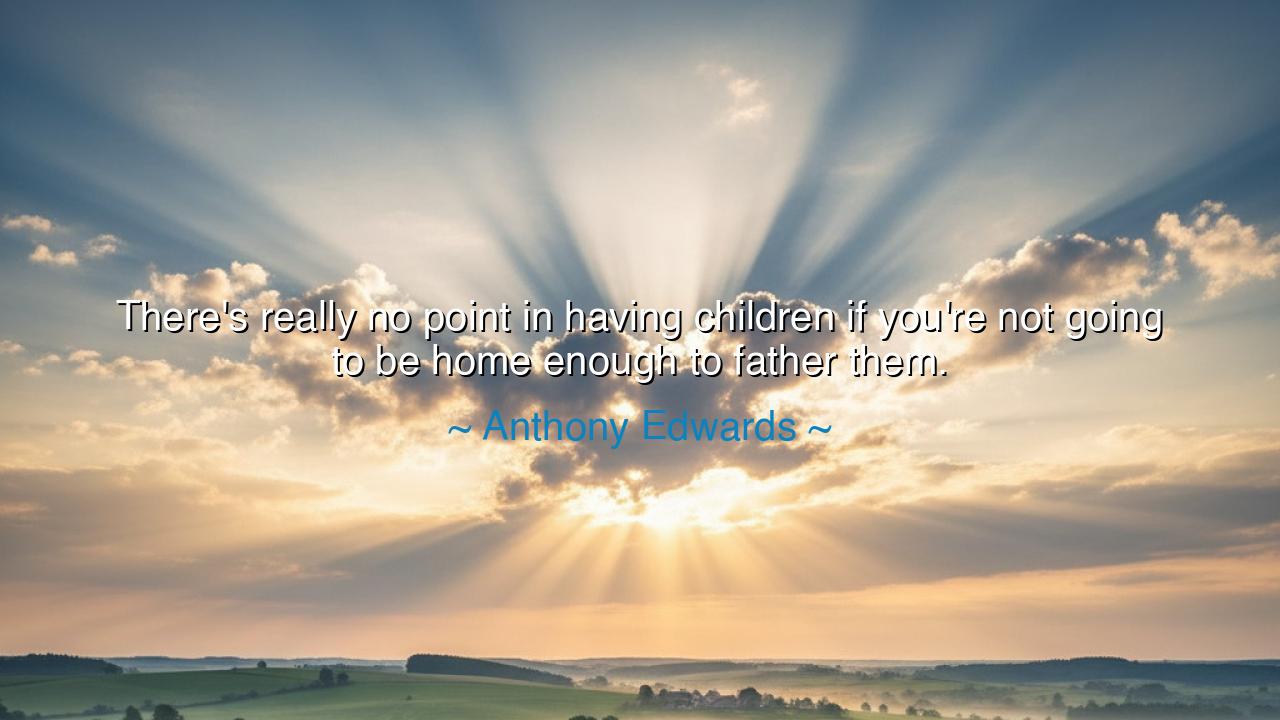
There's really no point in having children if you're not going to
There's really no point in having children if you're not going to be home enough to father them.






In the words of Anthony Edwards, spoken with the quiet authority of one who has seen both the glory of success and the ache of absence, we find a truth that strikes at the very heart of human duty: “There’s really no point in having children if you’re not going to be home enough to father them.” This is not the sentiment of sentimentality, but the wisdom of a man who has looked upon the balance of love and labor, and found that presence — not wealth, not fame, not provision — is the soul of fatherhood. His words echo across generations, reminding us that creation is not complete in birth alone; it is fulfilled only through care, time, and devotion.
To father a child is not merely to bring life into the world, but to nurture that life, to walk beside it, to shape its character with patience and compassion. The ancients understood this well. The philosopher Aristotle wrote that the purpose of family is not utility, but virtue — that the parent’s role is to teach the child how to live rightly, to prepare them for freedom. But how can one teach without being there to guide? Edwards’ reflection calls out to all who are lost in the pursuit of achievement, who chase crowns and coins at the expense of the small voices waiting at home. It is a reminder that the greatest legacy a man can leave is not his career or reputation, but the love and wisdom he imparts to his children.
In these words, we hear the cry of a generation that has learned too late the cost of absence. The modern world tempts the heart with ambition — promising greatness through busyness and purpose through endless motion. Yet what use is triumph if it leaves behind a hollow home? The father who conquers the world but loses his child’s trust has traded eternity for dust. The presence of a parent, though quiet and unseen, builds foundations stronger than empires. For the child who grows under the gaze of love learns courage, empathy, and belonging — gifts no wealth can buy.
Consider the life of Marcus Aurelius, the Roman emperor and philosopher. Though burdened with the weight of empire, he wrote in his meditations not of victory or conquest, but of the virtues he wished to pass to his son, Commodus. Yet history tells us that despite his wisdom, his absence from his son’s upbringing led to tragedy. Commodus became cruel, reckless, and self-indulgent — a shadow of the father he never truly knew. In this story, as in Edwards’ reflection, we see the same truth: that power and success cannot replace presence, and that the time withheld from our children becomes the inheritance they are forced to bear.
Anthony Edwards, known for his roles in film and television, spoke these words from personal conviction — from his decision to step back from a thriving career to be with his family. He understood what many fail to see until the years have passed: that fatherhood is not measured in grand gestures, but in daily presence — in the listening, the teaching, the laughter shared at the dinner table. His words stand as both confession and commandment: that the child does not remember the awards their parent won, but the evenings they came home, the stories they told, the comfort of their steady hand.
There is also a sacred echo in his statement, for across all traditions, the figure of the father is one of stewardship and sacrifice. The Hebrew scriptures speak of fathers teaching their children “when you walk by the way, when you lie down, and when you rise.” The old Chinese sages, too, taught that a father’s virtue shapes the harmony of the household and, by extension, the harmony of the world. To neglect the home, therefore, is not merely to fail a family — it is to disrupt the divine order of life itself. The child’s heart is the soil of civilization, and the father’s presence its sun.
The lesson, then, is both urgent and eternal: to give life is an act of nature; to nurture life is an act of love. The practical teaching is simple yet profound — to prioritize presence over prestige, to measure success not in the hours worked but in the hearts reached. Fathers — and indeed all parents — must remember that their greatest work is not what they build outside the home, but who they raise within it. To be home, in body and in spirit, is to fulfill one’s noblest duty.
So remember the wisdom of Anthony Edwards: no crown shines brighter than the light in a child’s eyes when a parent walks through the door. Let the world wait; the moment spent with one’s child is a moment spent with eternity. For in the end, when the applause fades and the trophies rust, it is love — steadfast, patient, and present — that endures. And he who learns to father well has not only raised a child, but has kept faith with the very meaning of life itself.






AAdministratorAdministrator
Welcome, honored guests. Please leave a comment, we will respond soon